1953
written about 1987 by Gwen Evans
Very many thanks to Jessica Thorndike for allowing us to publish her mum’s story. Gwen is now well into her 90s and is still living on Canvey Island. Gwen kept a diary so when this was written she would have been able to look back on the events she wrote about then. This is very detailed covering events not previously told to us and is well worth reading.
~~~~~~~~~~~~~~~~~~~~~~~~~~
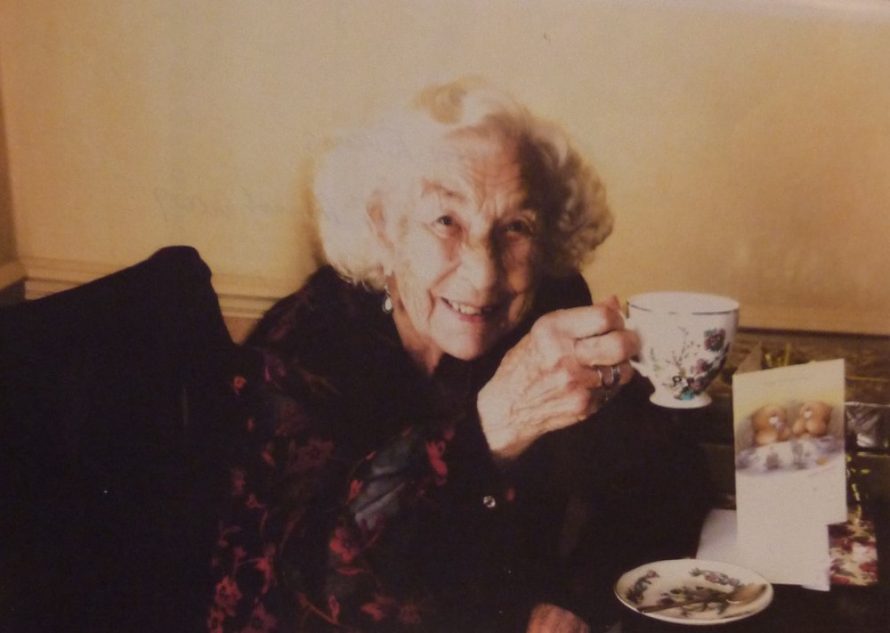
Gwen Evans
On Saturday evening my mother and I went off, as usual, to the Kynoch’s club, the two little ones were in bed asleep and my husband was having a read by the fire. Jessica and Christopher were busy with their homework, it was a rather blustery night, as I recall, so we walked rapidly along and were pleased to reach the club and the warmth,
We sat and chatted to various friends, had our usual drink of ginger wine paid our dues on the Christmas club, and, after saying goodnight to our friends, left. Leaving the warmth behind us we stepped outside the Kynoch’s and the wind hit us full in the face. It was bitterly cold so we decided to start walking instead of waiting for a bus, so arm in arm we set off. It was a beautiful night, a full moon making it almost as bright as day. The small white puffy clouds were moving across the face of the moon, everything was etched in black and silver, the pavements glistened with frost. We were laughing as we walked home being buffeted by the wind. As we neared the Point we could hear the thunder of the waves, and the bell buoys mournfully ringing. We agreed it would be lovely to be home in the warmth. Little did we know what this night had in store for us, and how it well might have contributed to our future lives. So we hurried our steps, and were soon home and snug. After a cup of cocoa we were all off to bed, unaware of the drama being played out at the Island in the early hours of Sunday morning.
We were jerked out of sleep by a banging on our bedroom window, it was my sister-in-law Jean. “Hurry and get up, the sea wall has broken, I’m going to fetch Pop, all his bee hives are floating round the garden, he must come round and sort them out, so get up, the Island is flooded.” I looked out of the window, but Aalten Avenue was as quiet and peaceful as ever, and not a drop of water anywhere. Nevertheless we dressed quickly and went into the children telling Jessica and Christopher what Auntie Jean had told us, getting Muriel and Michael washed and dressed, cooking breakfast, which happened to be kippers.
It still looked quite peaceful, although Grandpa had not returned home and there was no sign of water. Dad and I decided to have a look round ourselves. We walked straight up Aalten Avenue and up to the sea wall, imagine our horror when we saw water pouring into the dykes, and as far as our eyes could see, there was nothing but water, with bungalows dotted here and there. We hurried back to the house and explained what we had seen, we had a quick cup of tea as Grandpa had just arrived back home. We then decided to go round to the shops to try and find out what was happening.
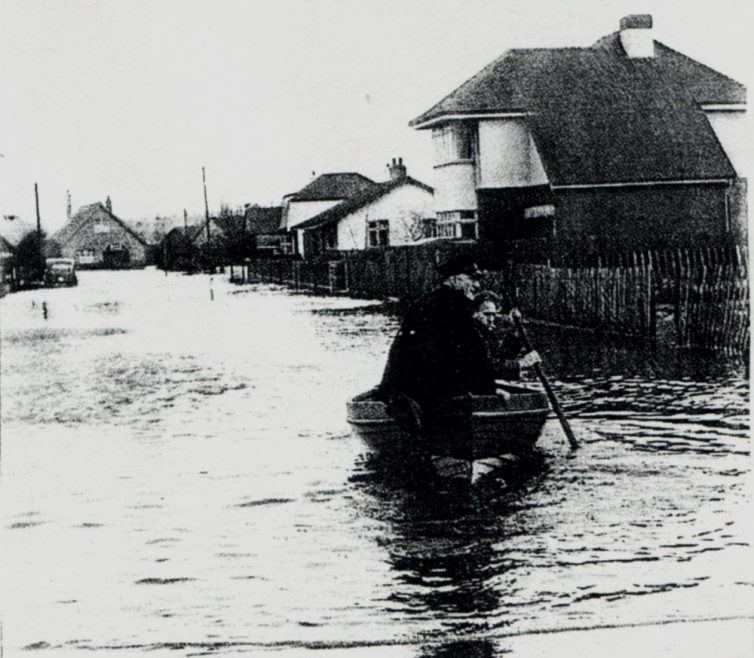
Canvey Island
When we opened the back door the water was lapping the steps. I had to put on a pair of dad’s wellies, and when he had put his on too, we set off for Leighbeck. There wasn’t a soul about and it was deathly quiet, not a sound anywhere, it was so eerie we began to feel quite creepy. We found one of the shops open, the veggie shop, we pushed open the door, there was someone shuffling about, so we called out. The greengrocer came into the shop and said the Island had been completey evacuated, and we were about the last on the Island, also there was only one more lorry being sent over as the water was rising rapidly and they wouldn’t be able to get through, also the tide was coming in fast. They expected another high tide, and the wall was already breaching, this would be our last chance to get away. As we looked at the seawall to our left, we could see the waves washing over the top and knew it would never hold.
Suddenly we heard a motor, running and shouting, and about half a dozen soldiers were calling for us. They ran round with us to ‘Vale-End’ where poor Nana was in an awful state, as by now the water had risen considerably and she was worried about the children. “Just grab anything you want Lady, you’ve got two minutes” we just fled. One of the soldiers grabbed Murie, another took Michael, Jessica found Gyp’s lead. A little fellow about 5’5” told Nana to climb on his back and they went staggering off, that was a sight to see! Poor Nana perched on the little fellows back, complete with bag, and looking hugh in her fur coat, top heavy, a little light relief! Jessica and Chris between them took Gyp, then, never looking behind us we left ‘Vale End’. We had to go through the garden at the back of the house and onto the made up road, which was higher than us, as they wouldn’t have been able to get the lorry out. It was a worry not being able to find Lucky our cat, we just couldn’t hold up the lorry any longer, as there was quite a bit of tension about as you can imagine. As soon as everyone was aboard, we were off. It was only later that we realised we had no money except for a few bob, Murie had no coat, I was still wearing Dad’s wellies Grandpa had just grabbed a couple of things, a packet of Persil and the alarm clock, also a hot water bottle. Fay remembers just taking her curlers we’ve laughed about this since, its funny what one does in a crisis.
In due course we arrived in Benfleet after travelling along the Long Rd which looked like a river as we went along. We were taken to a school, it was full of people, some were sitting quietly just staring into space, a stunned look on their faces, many men and women were weeping, quite a few wrapped in blankets were waiting for news of their families. One lady we knew quite well was wrapped in a blanket, walking up and down, crying, or rather wailing and asking everyone if they had found her children. It was a sad and horrible time for so many, quite q number of people left the Island that night, never to return, others lost their homes, as many were only holiday homes, and at that time were not built of brick, others lost everything, even their families. We were told later over fifty people lost lives on the Island that night. People were good to us. The WVS were there in force, giving everyone hot soup, meat pies and tea, trying to keep everyone as warm and comfortable as possible. Later people came from all over to help, offering accommodation. A lady who was a customer of ours said she would give us a room for the night. By this time Nana and Grandpa were settled, so we went off with this lady. I think it was the worst night we ever had, worse even than the war years, having to sit about in damp cold shelters. This lady had a room, it was empty, she put an old oil stove in the room which she insisted we turn off before going to sleep. It was very tiny and gave no heat at all. The school had issued everyone with one blanket, so that night we spent on the floor boards, all huddled together for warmth. Auntie Fay was with us as well. And as soon as it was light, we were off! Returning to the school where once again we were given hot soup, rolls and tea. Auntie May was shocked when later we told her what had happened.
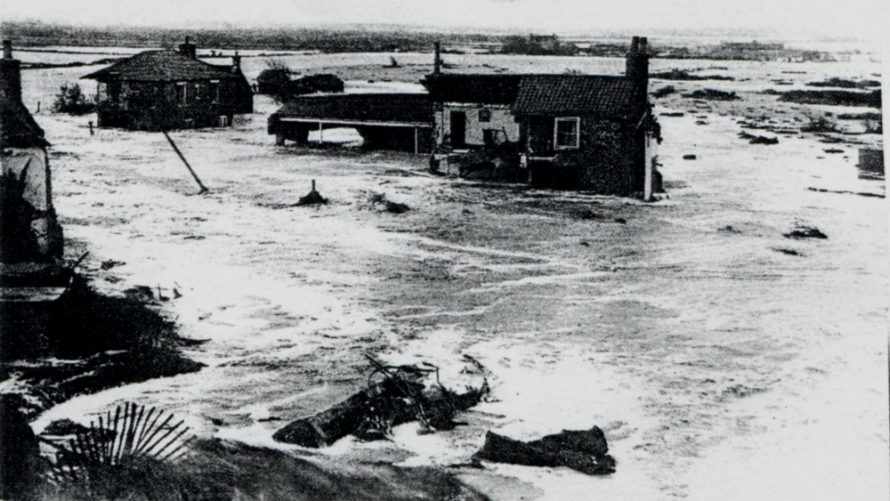
Canvey Island
Meanwhile we sat about on the school. Waiting to find out what was happening. Suddenly there was a lot of running about, I picked up Murie and went into another part of the school. Jessica was with me too. We were trying to find the canteen they had set up. We went over to the counter, and then through the door behind the counter came the Queen Mother, and Princess Margaret Rose we were about three feet away from them, just the counter between us. The Queen asked me how I had fared, also had I lost everything, and I said “No! we have been lucky”. Then she touched Murie’s hand and said what a nice toy Murie had, so Murie promptly said “you can keep it if you want to”. The Queen smiled and so did the Princess, and then they passed on, speaking to one or two other people, before going back through the door. Of course the photographers were there, and it was because of the News Reel, that my friend Doris saw us on the television, and wrote asking us to stay in York with her and her family. Meanwhile as I said, Auntie May was upset, she said she could put Chris in her bed chair, and we could sleep in the Manor House. Although there was a bed it had no mattress, so we just had to make the best of the situation, of course we couldn’t get a room anywhere, as there were so many homeless people. We spent two days with May, and then it was, that Doris contacted us, so I took Jessica, Murie and Michael to York, where we stayed for two weeks. Again it was bitterly cold up there, ice and snow everywhere and although we were made very welcome, we could not wait to get back to Essex. The people in York were very good to us, my friend had to ask for permission to have us, as she was in married quarters, and when that was given, the Barrack Warden issued her with six beds and piles of bedding, so we were quite comfortable. Unfortunately Jessica had very badly swollen glands, so was a bit on the miserable side most of the time we were away in York, poor little kid.
Meanwhile, Chris and Dad, stayed in Benfleet, as the shop too had been flooded, and was in an awful state. The water had risen up high, it had ruined all the electrical equipment, the big fish fridge was about 7ft tall, with the motor and fan, above. This was full of sea water too and the gas jets ruined. In fact everything was such a mess and rusted up, you can imagine the amount of work to get it in working order again.
The first day Dad was in the shop looking at all this mess, when a man came in and said to dad, “You ought to be ashamed of yourself, messing about down here, you ought to be on the Island helping the flood victims”. Dad said quietly, “My home was over there and my livelihood’s here”. Which soon shut that man up, “Sorry mate “he said, “I didn’t know”.
Dave told us how his Uncle Bob and Auntie Eileen had to leave their house as quickly as they could, as the water was rising fast. When they went back three weeks later, they heard bird song, it was their two orange billed weavers, they were hooked up in the ceiling, and the bottom of the cage was just clear of the water. Dave said “They didn’t know how they, managed to survive all that time”. Stories trickled through of what some people went through that night, it was estimated that more than three hundred people were drowned, and twenty four thousand homes were gone on the East coast. Everyone on Canvey were taken completely by surprise, people wakened out of their sleep couldn’t believe what they saw, nothing but water everywhere rolling across the fields with the moonlight reflected on it. The sirens were wailing trying to waken heavy sleepers. People were drowned in their beds. They stood no chance at all, the wind was whipped up into a hurricane of 100mph, the freak tide wave came round the back of the Island, straight over the wall at “Lakeside” and devastated the bungalows. After the wave subsided, water was seven to eight feet deep. There were bodies spread-eagled in trees and floating among the debris. One young family were sitting on the roof of their house. When they were rescued the husband insisted that they take his wife and new born baby first, he thought they were asleep, but they were both dead, he was left with just his baby son. There were many similar stories. Jessica had been very upset when she heard that ner school teacher had drowned that night.
Fay can’t remember much about this time except grabbing her curlers, and being in Mrs H’s house, sleeping on floorboards, and being frozen, and being rowed around the Island. After a few days Fay managed to get back to Canvey with Cyril. They arrived at the “Red Lion”, then had to row the rest of the way to the point. They went to ‘Vale End’ as Fay was hoping to pick up some odds and ends for us. When she went into her bedroom, she found the drawers which she had put on her bed, floating about, all her underwear had changed colour, although she did salvage some, they left all the doors open to let the tide in and out, can you imagine that? There wasn’t anything they could do at the time. They hunted for ‘Lucky’ and found him perched on a fence, the poor little thing must have been starving. They had an awful job trying to get him down, as he was terrified. Eventually they got him into the boat and rowed back to the Red Cow, thence back to Benfleet. When Fay handed over Lucky he shot straight up the chimney, hunger drove him down at last and he settled down.
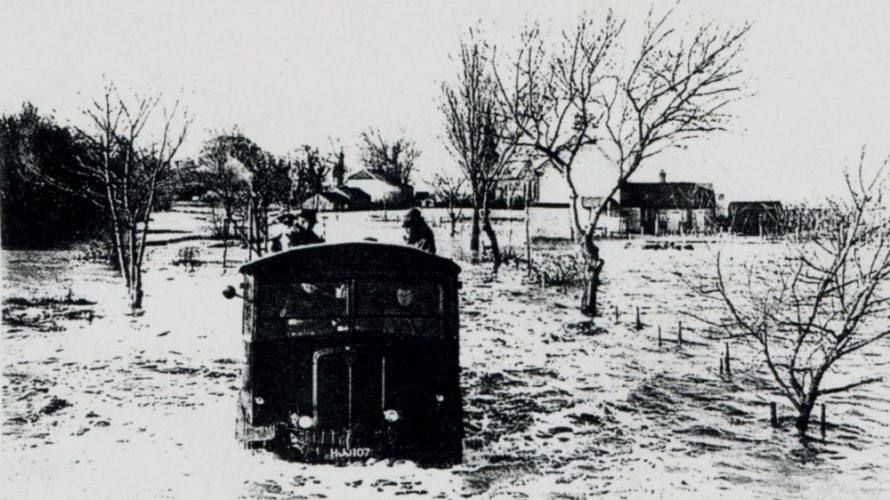
Canvey Island
Cyril was granted Compassionate Leave, and was busy over on Canvey, filling up sandbags to shore up the wall temporarily. No one was allowed to return to the Island for fear of typhoid owing to the seepage of sewerage and the carcases of dead animals that were still floating about. Nana and Grandpa went off and bought a caravan, and Fay went with them to ‘Ash Vale’ so within a week of the flood, they were comfortably settled there.
On our return to Benfleet from York a few people were returning to the Island, so we left the four children with Auntie May and went over ourselves too see the extent of the damage following the flood. Everyone was lending a hand to repair the seawall and clear up the mess. There was so much rubbish everywhere, the water had gone although there was quite a nasty smell about, rotting vegetation etc. When we finally reached Vale End we could hardly believe our eyes, the garden was an awful mess. The salt water had killed nearly all the plants, the fruit trees, plums, apples and pears looked alright but we lost the cherry trees. There were no vegetables whatsoever. All the rustic fences were down too, in fact it was like ‘no man’s land’ mud and mess everywhere, and this particular stench. This wasn’t all. When we went inside the house, well you can just imagine what it was like. There were still pools of water in the lower half of the house, the new rooms. There was a dirty tide mark about three feet high all around the rooms, and stuck on hard bus tickets, pieces of loo paper, old leaves, in fact, any old debris you can imagine. Inches of thick grey mud on the floors, so we fetched tools from the shed, and shovelled out the mud into the garden. Then we took buckets of water, and threw then through the house to wash the worst off, by brushing the mud through the back door. This cleaning up business went on for about a week until it was clean and fresh, ready to bring the children back. We never thoroughly eradicated the salt water marks, although we tried several preparations, and in spite of taking the plaster off the walls and having them replastered, the salt was still in the bricks, discolouring the wallpaper.
Of course Canvey wanted to help the people as much as possible, and in their infinite wisdom gave us one cwt of coal to dry our houses out, not one Ton, but one cwt, if, you wnet down and collected it yourself. People who lived on made up roads fared better, as they brought in big lorries which dried out their houses with hot air blowers. “All these things are sent to try us”, so they say, never mind we were all together again, and none the worse in spite of having half floors where the wood had rotted away. The little ones enjoyed this situation. They would sit on a couple of floor boards, with their legs dangling down the hole, playing flood games, a good thing they were only babies and really did not understand.
Once more we settled down, although I was always apprehensive for fear of another high tide, and used to lie in bed planning what I would do, if our end of the Island caught the brunt of it next time. I always ended up thinking I would push the Hoovermatic under the hatch, and then put the children up into the loft for safety, hoping the house would be strong enough to stand. Usually by this time I’d be in a nervous sweat.
A couple of weeks after we returned to ‘Vale End’ the local paper ‘Canvey News’ was delivered to us. There was a double spread on life in Canada, and an invitation to emigrate, from the Mayor of Winnipeg, offering jobs, accommodation, interest free loans etc, to any family from the flood area, the only stipulation was that you repaid your loan within two years also that were all fit. Auntie Stella, Uncle Jack and the two boys Trevor and Geoffrey were already there and living in Hamilton, Ontario. We thought it was a good idea as we received glowing accounts from them, Jacks comments were ‘come and live here money grows on trees’; also Dad’s brother Bill and wife Lucy and their family, Bill and Muriel, Sylvia and Jack, also Mavis and Vivian were also in Hamilton. So after talking it over among ourselves, we decided to give it a go. We had nothing, so we had nothing to lose.
We applied to Canada house, and by rushing everything through for us, medicals, interviews etc, we were ready for off. It was quite a rush, we had the passport photos taken, and had to go to Petit France with them for our passports. One day all the family went to Canada House for medicals. It went Like this; we were all led into a room, an affable chap sat behind a desk, he looked at us one at a time and said “You look a healthy lot” and stamped our papers, then we had xrays the same day, we were all passed fit. A couple of days later Dad and I went to Canada House again for the interviews. A very nice Canadian chap gave us a pep talk of sorts; he said “It’s a big step to leave your country, and go to Canada, without the prospect of employment, and four children below working age; have a walk round and talk it over, if you still want to go then I’ll fill in and sign your papers. All the papers were stamped all over with the words ‘Flood Victims’. Dad and I went into a nearby park, I remember it was a beautiful Spring day, there were masses of daffodils and tulips and the grass was that lovely soft spring green, we sat on a seat under the trees and wondered what we ought to do, stay, or take the plunge. So I said, “Let’s go back, if he has the papers ready to sign, we’ll go, if he hasn’t filled them in, we won’t”. We retraced our steps, went into the office the chap looked up and smiled, “The papers are ready for you to sign” we said that was good enough for us, and we never regretted it.
We leased the house to a Mr and Mrs Jacobs for two years, some repair work had to be done, and they were quite happy about this, we left sufficient funds with the builder, and left our address in Canada, in case we needed to be contacted, so went off with a clear conscience, one snag remained, as everything had been rushed forward for us to yet away quickly, we were notified the train time from Euston, the connection times etc: but no tickets came through, we just had to leave or we would have missed all our connections. There we were sitting in the bus, waiting for it to leave for Benfleet station, when the postman came rushing up saying “I’ve got your tickets” what a relief, from then, all was ‘plain sailing’ pardon the pun.
So on the morning of 9th June we left Convey Island. Auntie May, the dear old soul, come to see us off at Benfleet, kissed us all goodbye, her eyes full of tears, she was a sentimental person with a heart of gold. She gave dad a thump and said “Look after yourselves”. As the train left the station, the last thing we saw was all the Taxi drivers waving us off, and May in her white overall dabbing at her eyes and waving, although it was June, it was another bitterly cold day, it was quite warm in the compartment, which we had to ourselves, and I think we were all very excited as the train rushed along to London. We left the train at Fenchurch Street and caught a Taxi to Euston, where the powers that be’ had reserved a carriage in our names, so the window had our individual names plastered all over it and “FLOOD VICTIMS”, in due course we arrived in Liverpool and embarked on the “Empress of Australia”. Dad and children were all very good sailors thank goodness. As usual I was definitely under the weather, my first real experience of sea sickness. I stayed in my bunk fully clothed for about three days, too ill to care about anything. Dad said the children had a wonderful time, they were all fine and enjoyed the pleasures of the voyage. We docked at Montreal in Quebec on the morning of the 15th June, had a good breakfast on board, went through customs and were then taken to Montreal station, by a mad french bus driver. All the porters at the station were black, and they all wore a red fez, looking quite colourful.
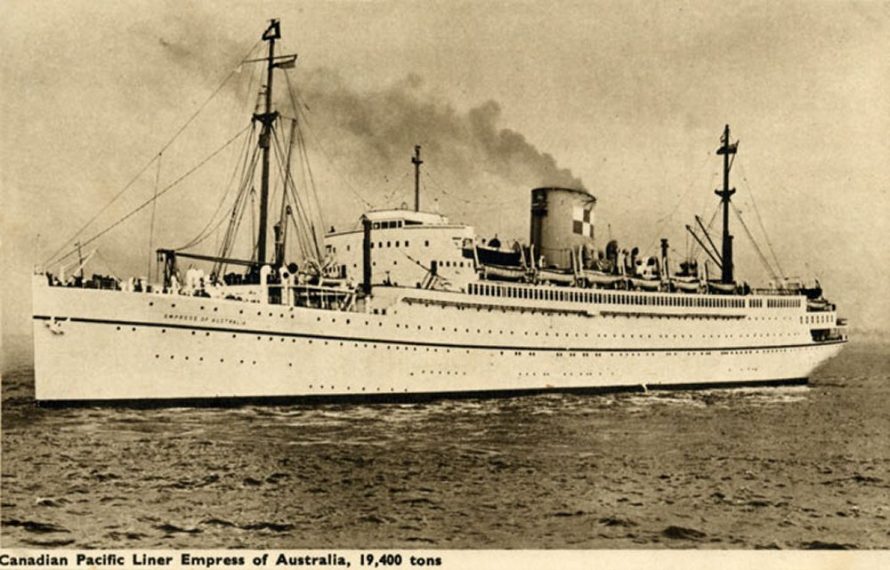
We had to wait till eleven o’clock for our train, (and what beautiful trains they are) so were pleased when we finally got under way. The journey was quite uneventful until we arrived at about twelve hours later in Toronto, Ontario, where we had to change trains for Hamilton. There was a mix up with our luggage, and the delay caused us to miss our connection, so we had an hour to wait. Eventually our train puffed its way into the station. Canadian trains are so huge, or seem so, as passengers are on a level with the railway lines, and the trains seem to loom over a person. Usually there are suite a few steps up into the train which adds to the height, as there are no platforms as such, when you get two trains together, and you are between the two, its quite claustrophobic. Anyway we were soon aboard, helped by the porters, and on the last leg of the journey. An hour or so later we arrived at Hamilton; It was 3.30 a.m. on 16th June.
The children were asleep on their feet, the Station Master came running up and took Michael into his arms, and carried him from the train. Dad carried Murie, Jessica and Chris were walking with their eyes closed, hanging onto me. Suddenly we saw Uncle Jack coming towards us, looking clean and cool, smiling and immaculate; white silk shirt, pale blue slacks, and there we were looking like waifs and strays, as the temperature that night was 75 degs and we were all in winter clothes, dead tired and definitely travel stained. Jack took us in hand and about half an hour later we arrived at Ferguson St., where Aunty Stella had a beautiful meal ready, cold meats, salad, fruit and cream, and best of all, the English remedy for all ills, A CUPPA.




Comments about this page
This is, in my opinion, one of the best,if not the best account covering the 1953 Flood. Well worth reading this story which made one feel as if you were right there.!! Thanks for publishing this very detailed account. Gerald Hudson.
What an amazing account!! Only yesterday did I go to Harwich to listen to a talk, given by Patricia Rennoldson Smith, to launch her book ‘The 1953 Essex Flood Disaster’. I’m sure she would have loved to include this tale in her book. I will try to make contact with her, as I’m sure she would love to read this article. Thank you Gwen, Jessica and Janet for sharing this for us all to read!!!
Cheri we did not have this story then or Pat would have known about it. She knows now.
Thanks for getting back to me Janet. And thanks for letting Pat know. Am enjoying reading her book. I was only 5 in 1953 but do have some memories of my own, brought back to life by the talk and the book! Keep up your good work and thanks again!
Fantastic that Gwen kept such a detailed and wonderfully descriptive account and that it survived, thanks to Jessica. I knew I would find such stories after the book was finished, but the main thing is that her story is now available as a record of life at the time and of the excellent response of the people of Canvey to the disaster. Thanks Janet!
This is a gem! I think I’ve read nearly every page since we started the Archive and this is one of the best. It’s so well written I’m waiting for the next instalment.
What a fantastic diary of one Woman’s account of the Flood. Thank you to the family for sharing it with all of us. I was only a toddler in the flood so don’t remember anything but it has certainly given me an insight of what was happening to an ordinary family on that tragic night. Would love to hear the next instalment of Life in Canada!!
They returned to Canvey in 1954 Barbara
Sorry Janet – but we actually returned to England in 1955 and went to live again in our old family home which was called ‘Vale End’ in Aalten Avenue. The house no longer exists, but when we returned our lives continued to be filled with lots of love and we all enjoyed many moments of fun, and we all share great memories from our life on Canvey. My Mother still lives on the island and I return to see her when I can – and it seems that the same community feeling that once existed during the flood remains to this day.
My grandparents lived in Aalten Avenue (Linden Lea), the Deanes and I was led to believe they didn’t evacuat as the water just got within an inch of coming into the bungalow as it was raised off the ground.
My father in law was a 8year old boy during the floods and being born on the island never left until he was evacuated to BENFLEET with other children he used to tell us stories of the heartache it caused and he lost a friend who drowned being caught up in some chicken wire very harrowing for all of them He was WARNER WALLACE, I loved reading Gwen’s story very very interesting .
Wow what memories, so interesting to read , my dad was on the island working for a local building company, he helped out on the night of the flood , my mum was in London with my mum as dad was planning to make a home on Canvey I wasn’t born until 1960, dad picked a plot at Hawkesbury road where I grew up, until 75 when we moved to Cornwall, I have lovely memories of growing up on Canvey and dad telling me about that fateful night
Add a comment about this page